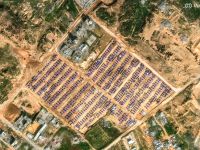While food security in the MENA has always been crucial as the region faces geographical and economic challenges, this year has been particularly pivotal.
Where there's conflict, there's hunger.
— David Beasley (@WFPChief) October 12, 2020
The #NobelPeacePrize is a reminder that food security, peace and stability go hand-in-hand. pic.twitter.com/GXM4iQl820
The COVID-19 crisis had triggered many fears over the region's food security situation, especially at the beginning, as countries resorted to full lockdowns, closing borders, and imposing partial and full curfews.
On a global level, international organizations have been warning of a worsening food crisis in different regions around the world, saying that 265 million people are feared to face critical levels of food shortages. 43 million of this group are located in the Middle East and Asia.
Due to limited arable lands and government policies prioritizing other industries over agriculture, rural communities have increasingly been relocating towards cities, dedicating more time to non-related economic activities and taking civil jobs. This has led to an increased reliance on importing food products, in almost all countries in the region. Jordan, for example, imports 97% of its wheat and grains needs. The UAE also imports about 85% of the food products consumed in the country.
‘’The UAE imports about 85% of its food. There is a need to embrace agritech to ensure food security in Mena.’’ says Hattem Mattar from The Mattar Farm at 'Tech in food' pic.twitter.com/WFWP7zRlGC
— Wamda ومضة (@WamdaME) April 29, 2019
Moreover, political unrest and militant conflicts in at least four Arab countries have ravaged farming communities, impacting food production in the region.
Additionally, the worsening climate change reality that has severely influenced weather temperatures, by bringing extreme heatwaves and snowstorms, floods, and wildfires, has destroyed massive areas of farms and crops, making it difficult for the agricultural sector to recover.
This year has been particularly difficult in terms of food security, as borders are forced through irregular activity in light of Coronavirus lockdowns and travel bans, leaving non-producing countries in a huge need.
According to a report published by The Global Network Against Food Crises on food challenges in 2020, about 24 million Yemenis making up 80% of the population require humanitarian assistance, and 1.7 of 5 million Palestinians in the West Bank and the Gaza Strip are food insecure.
In Syria, more than 9 million people are food insecure, while 1.5 million Lebanese people are reportedly falling below poverty lines.
IMF revises downwards its growth projections for Middle East and Central Asian economies.
— Arab News (@arabnews) July 13, 2020
Read more: https://t.co/UX9cdn5B8r pic.twitter.com/InO3kkCpQf
These serious numbers are amongst the main reasons the Nobel Peace Prize for the year was awarded to the World Food Program "for its efforts to combat hunger, for its contribution to bettering conditions for peace in conflict-affected areas and for acting as a driving force in efforts to prevent the use of hunger as a weapon of war and conflict".
Other Arab counties, specifically rich-oil ones in the GCC have the advantage of being able to afford to import the different needed food products and to make them available for their populations throughout the year. However, this year has also been affecting their expenses as their economies are pressured by the drop in oil prices and the semi worldwide halt on tourism.
Jordan imports 97% of its wheat and grains needs; the main source of energy for Jordanians.#Jordan #MiddleEast #AlBawabaNewshttps://t.co/zB5I0a3s9z
— Al Bawaba News (@AlBawabaEnglish) October 6, 2020
Last June, Saudi Arabia’s Minister of Environment, Water, and Agriculture has stated that his country has already started witnessing significant recovery following the economic damage caused by the pandemic, as "the Kingdom had also achieved unprecedented levels of self-sufficiency in many agricultural products such as dates, where it surpassed 125%, 60% in vegetables and poultry, 55% in fish, 116% in eggs, and 109% in milk."
Finally, Arab countries have a long way of work, in order for them to achieve food security by implementing long-term programs that encourage the agricultural sector and support the food manufacturing industry, which can eventually help support the local economy.







